#zutara criticism
Text
I love Zutara as much as the next girlie, but I think people romanticizing Zuko catching Azula's lightning in the Final Agni Kai are doing Zuko's character a massive disservice. He would have done that for anyone. Not just anyone in the Gaang, anyone.
He did it for the division he ended up getting burned over. He did it for his subordinate that was going to fall to his death after the ship was struck by lightning. He did it for Lee, when he was kidnapped by Gao. He did it for Iroh, when he confronted his dad and tried to break him out of prison. He did it for the whole Gaang at the Western Air Temple. He did it for Sokka, Suki, and Hakoda at the Boiling Rock.
His whole character revolves around saving everyone else first. Hell, he tried to save Zhao of all people! There's no way that would have gone well for Zuko if Zhao had actually taken his hand. He always does what he thinks is right first before considering his own safety.
Zuko always saves other people. Even if, especially if, he can't save himself.
#look i love zutara#but zuko has no conception of personal safety#there are better zutara moments in atla!!!!#like i will absolutely still read fanfic that romanticizes that scene#but it still would have happened if literally anyone else had been standing there#zutara#zutara criticism#i'm going to tag this as#anti zutara#just in case someone doesn't want to see a critique of the ship#i'm not really critiquing the ship#but out of an abundance of caution#uh actual antis if you see this: behave yourselves lol#zuko#avatar the last airbender#atla
4K notes
·
View notes
Text
Look I know people love to act like Zuko is the most dangerous, toxic, and temperamental character… but there is exactly one (1) male character Katara was canonically responsible for calming down from violent, destructive tantrums at risk to herself and it wasn’t Zuko… 🐸☕️
#another overlooked toxic trope tbh#zutara#atla#zuko#katara#aang critical#anti kataang#canon critical
780 notes
·
View notes
Text
Me, screaming into the void: I DON'T HATE MAI I JUST FEEL LIKE SHE NEEDED MORE DEVELOPMENT OUTSIDE OF ZUKO AND HER ARC SHOULDN'T REVOLVE AROUND HER LOVE INTEREST
Also me, still screaming into the void: I DON'T HATE AANG I JUST QUESTION WHETHER HIS ROMANTIC INTEREST IN KATARA BRINGS OUT THE BEST SIDES OF HIM AND FEEL AS THOUGH HE AND HIS DEVELOPMENT IS NOT ABOVE NECESSARY CRITICISM
#why do antis think I hate either of them the moment I question their development and the writing choices bryke made for them#they're good characters I just want them to live up to their full potential#a lot of their actions in season 3 especially revolving around romance were counter intuitive to their arcs made them come off as jerks#it got to the point of character assassination istg#anti maiko#anti kataang#mai#aang#criticism is not hate#aang critical#anti bryke#this doesn't have anything to do with zutara but tagging for exposure#zutara
572 notes
·
View notes
Text
bryke: “people only shipped zutara because it was dark and intriguing”
me:
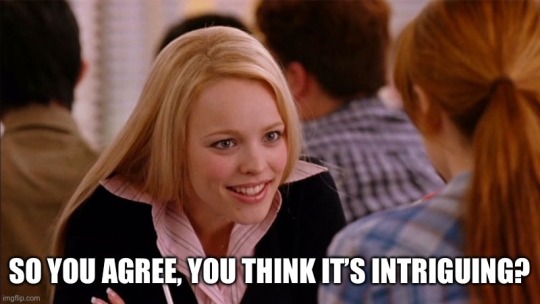
#zutara#i am NOT putting this in the main tags lmao#polls found i do have an ounce of self preservation#anyway. many of talked about why they disagree with the assessment of zutara as a ‘dark’ shipa#and also how moralizing shipping in general is Strange#but also. why is intriguing being used as an insult here. curious minds want to know.#(it’s me i’m curious minds)#bryke critical
535 notes
·
View notes
Text
Zutara, romance novels, and the female gaze
Okay so I’ve been thinking about the female gaze a LOT so I checked out a subreddit about romance novels, despite never having read one. I came across this meme (which was initially a Tumblr post and then got posted to Instagram and then to Reddit and I’m now bringing back to Tumblr — Internet telephone, pls never change):
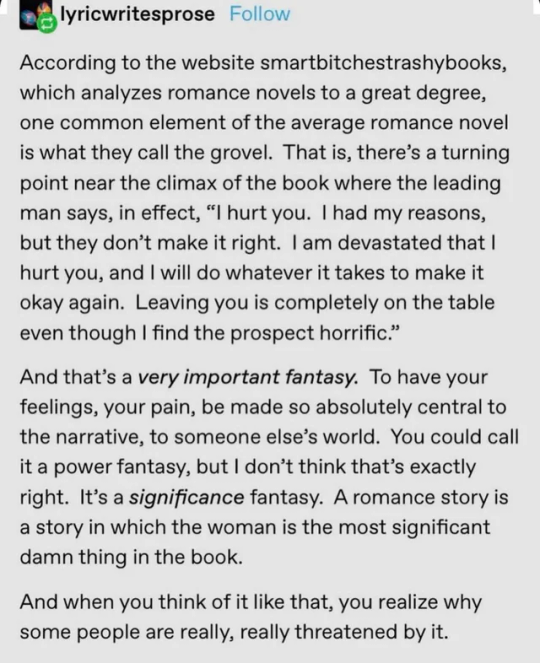
And…what is The Southern Raiders, if not a platonic grovel? Katara’s pain is central to the episode. It’s central to Zuko. Zuko asks Katara what he can do to make up for his betrayal; she demands the impossible. He reads between the lines, cockblocks her brother to get the necessary information, and then waits outside her door overnight (which he also did for Iroh, the one person we know for sure he loves). He basically makes himself a receptacle for her rage, and he holds space for her by coming with her on her revenge quest and carrying their bags and not saying a damn thing about what she should and should not do beyond like…asking her to rest. And obviously the grovel works! She forgives him and then they’re thick as thieves, bantering and fighting and saving each other’s lives, etc.
On a different note, I’ve been told that enemies to lovers is one of the biggest tropes in romance novels, similar to YA lit and fanfic. Here’s something else I found in the romance novel discourse:
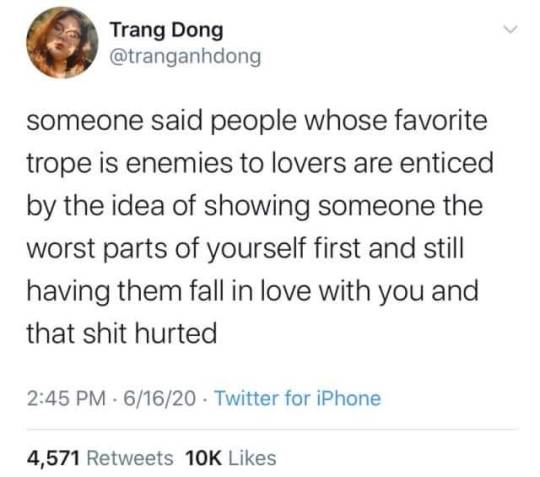
And…yeah. In TSR, Katara really does show Zuko her worst self, because she doesn’t feel the need to perform for him. She doesn’t feel the need to perform moral perfection OR cold blooded vengeance. She bloodbends in front of him and he just goes with it. She doesn’t kill Yon Rha and he just goes with it. He doesn’t treat her any differently afterwards. Maybe they talk about it off screen, but I kind of like the idea that they don’t, because Katara doesn’t need to explain anything.
And it’s so interesting, because some people in the ATLA fandom have a totally different read on TSR. They think Zuko was encouraging Katara to get revenge (by what, keeping his mouth shut?), and that Aang is the one who acts as her moral compass. I believe that either Bryan or Mike said in the DVD commentary that Aang is the angel on her shoulder the entire time. And this interpretation does make sense if you see it from the male gaze, where Katara as an object of affection is acting in an angry, irrational, threatening way. But if you see it from the female gaze, you recognize that actually it’s probably the most emotionally taxing experience Katara has to go through, and she doesn’t owe it to be nice or perfect to anybody. Katara’s formative trauma literally comes to a head, and she has to make a decision — no, a discovery — about who she is in relation to the tragedy that defines her life and even her identity (as a waterbender, as a parentified child who becomes the mom friend, as a genocide victim), and she’s accompanied by someone who trusts her judgement and validates her feelings.
I’m not saying TSR is explicitly romantically coded, but when it conforms so well to romance novel tropes…is it any wonder that so many people thought “yes this is her man?” And then he takes lightning in the heart for her and reaches for her when he’s literally dying, I will never be normal about that either
#Zutara#Katara#Zuko#the southern raiders#Pro zutara#anti Bryke#I guess#I swear I’m not a Bryke anti but I feel like they just don’t get#The female gaze#and the fact that Zutara is so female gaze is kind of an accident and I find that fascinating#atla fandom critical#The southern raiders turned me into a Zutara shipper#one ep away from the finale#Zutara meta#My meta
1K notes
·
View notes
Text
Katara's other canon love interests give her agency, and her pov.
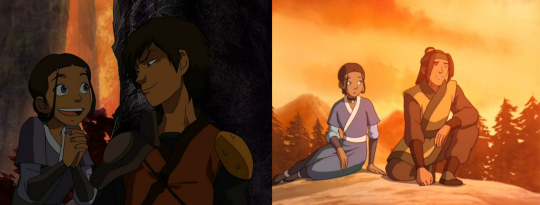
And gets a moment where the two connect over similar losses.

Except Aang.
Kataang is framed entirely from Aang's point of view.

Even when he violates her boundries.
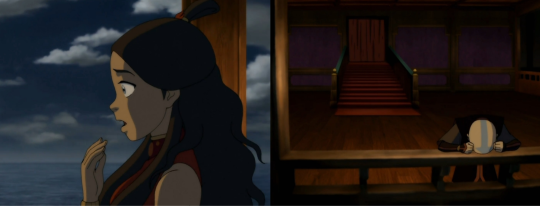
And is unable to handle Katara's grief.

But Zutara?
We get Katara's pov, and give her agency.

He saw her at her very worst, and wasn't at all hostile.

And Katara opened up to Zuko in the most significant way.
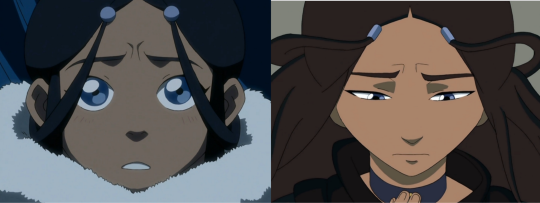
#How are they not canon#katara didn't even forgive Zuko while opening up to her#Aang had 3 books#and yet she opens up to Zuko#not her canonical love intetest#oh my god#zutara#zutara meta#anti kataang#aang critical#anti aang#anti anti zutara#kataang critical#the southern raiders#atla critical#anti bryke#bryke critical#avatar critical#pro zutara#pro zuko#zutara analysis#zutara was robbed#zutara forever#zutara evidence#katara of the southern water tribe#katara#zuko#zuko x katara#kataraxzuko#atla katara
2K notes
·
View notes
Text
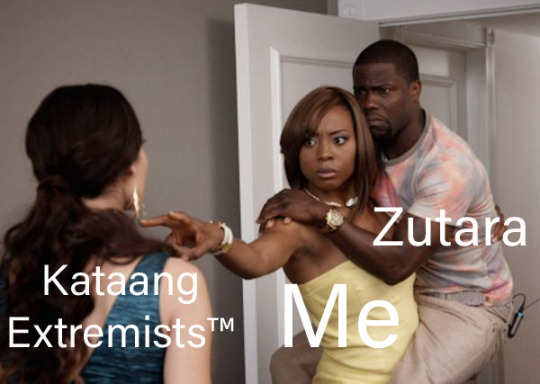
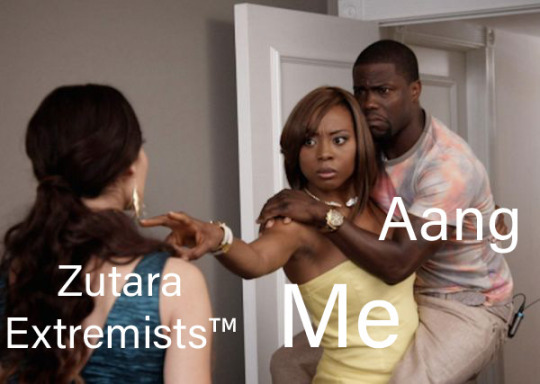
some of you are too angry at fictional children
#and it shows#like bffr#go touch grass#atla fandom critical#avatar: the last airbender#atla#atla meta#aang#katara#zuko#avatar the last airbender#zutara#avatar aang#atla aang#atla katara#atla zuko#prince zuko#fire lord zuko#master katara#atla meme#atla fandom problems#atla fandom salt#kataang critical#zutarian critical
708 notes
·
View notes
Text
is anyone going to tell the kat@angers that it's not feminist activism to argue Katara's arc in LOK is fine on the grounds that "some women want to be homemakers and that's okay!!"
Like you're not helping real women that way. In fact, most antis for the cannon ship ARE women. Many are homemakers themselves.
Katara is not a real woman. She is a fictional woman written by men.
Can the sensibilities and wishes of a girl change by the time she is a adult? Yes!
But as this is a textual character who, as per the text, rejects the societal structure of her fictional world (which mirrors our own) that women are and can only ever be docile homemakers (i.e. I don't want to heal, I want to fight; I will never turn my back on people who need me; let's start a prison riot; let's engage in vigilante ecoterrorism; let's pitch an absolute fit because the boys are not pulling their fair weight in the homemaking; let's confront my mother's killer at the absolute rejection and condemnation of the male figures whom I am to respect; etc) it is perfectly reasonable to argue that this end was not a natural course for her character.
Fictional characters are not real people. This means that they do not change their mind off screen. That is not an acceptable argument. That is called a "plot hole", which is a nonsensical change made at the convenience and contrivance of the writer(s), who in this case are men exhibited to not care for women or girls all that much. It is within THEIR character to write this way.
Regardless of who, if anyone, Katara ended up with, Katara tolerating disrespect, neglect, abuse of her children, giving up all of her former aspirations to live in the shadow of men, and dying as a mere footnote in history (and being alright with it!!) is not surprising given the absolute vitriol Bryke has shown toward female fans of their "creation". It was supposed to be a "boy" show. It was always supposed to be a "boy" show. The creators of Supernatural and Game of Thrones did the same thing. ATLA just did it first.
Arguing "not all women" is not activism in the face of what is really happening in this discourse. Sending death threats to real, actual women with feelings in defense of a fake pretend woman's fake pretend autonomy is performative activism, and worse, hypocritical.
Not all women agree with you. Not all women feel represented and find the outcome of Katara's story satisfactory. If y'all care about feminism and respecting women's choices so much, lay off the real life women you're so fond of harassing. Our views and opinions, while opposing your own, don't affect you.
#i know we've all told them but yall im tired#antikataang#anti kataang#its tagged but the people who this is targeted for will see it#folks perusing the zutara tag for hate purposes#yall are weird#guess who has never set foot in the kata@ng tag#its me <3#zutara#antibryke#anti bryke#bryke critical
426 notes
·
View notes
Text
It’s really funny how much people misremember certain aspects of ATLA and then proclaim to the internet stuff that either never happened or is extremely distorted with absolute certainty. For example, today I saw a person claiming that whole point of Katara’s character arc was unlearning the parentified behaviours she developed in wake of her mother’s death. That a huge part of Katara’s arc was a confrontation of how that trauma fundamentally shaped her maternal tendencies.
The thing is though…WE the audience, can recognize that the parentification Katara experienced was something that was really straining for her, but the TEXT doesn’t. The audience (or at least certain parts of the audience) can identify that her maternal tendencies were indicative of a responsibility that she took on far too young and subjected her to unnecessary pressure and stress. There are flashes of recognition maybe, but for the most part, the show doesn’t actually confront the negative impact that Katara’s maternal role had on her.
Katara never truly unlearns the maternal behaviours that put so much pressure on her because the text doesn’t see it as a bad thing. Arguably, the text doesn’t see much of a problem with the emotional labour Katara takes on and how that labour goes unreciprocated for the most part (particularly from her canon love interest). We see some reflections, but it’s not enough to support a reading of the text where that element is actually extremely obvious and a prominent point in her character arc.
We’re not the ones “watching the show with our eyes closed”, I think you’re just misremembering the canon progression of Katara’s arc to avoid confronting a real issue in the text.
#Katara#pro katara#avatar the last airbender#atla fandom critical#atla discourse#the gaang#character analysis#atla fandom discourse#zutara#atla critical#anti bryke
427 notes
·
View notes
Text
I know people have already talked about this topic, but I want to too.

There are a lot of jokes on the Internet about how Katara constantly mentions her mother as if it were the most important event, but...
Isn't that so? I mean, in the life of a little eight-year-old girl, this is truly the most important event in her life and she wants to share it.
Katara took on the role of an adult too early, and she didn't have the opportunity to work through this problem with anyone, because she's already an adult => she cannot afford to rely on someone. But she needs it, and that's what traveling with Aang gives her: the opportunity to find children like her and share with them the burden that she has been carrying all this time. Note that Haru, Jet, and even Zuko are people who not only have experienced loss, but also have some kind of responsibility for others: for their family or even for a group of people. She doesn't tell adults about this because she isn't looking for care, she's looking for understanding of her feelings.
The problem is that it's not enough for her. Her sadness turns to rage because the further the story goes, the less satisfied Katara becomes.
The closer the heroes get to the end of the war, the more angry Katara gets: first at her father, then more specifically at Zuko. And, in the end, she finds the cause of this anger, as well as the opportunity to satisfy the thirst for understanding of her grief - the murderer of her mother. She needed revenge not just because it was fair, but because from the very beginning of the series, Katara was looking for an opportunity to calm those feelings that were rushing out. And her attempts to do this by expressing the problem were not enough. She needed more, and she got it by facing the biggest monster in her life.
In general, the “monster” metaphor obviously speaks not only about Yon Ra, but also about Katara herself. Or rather about her anger. Judge for yourself: she had to restrain a storm of emotions from the age of eight; she began to reveal her grief only in the first season, that is, at the age of 14. She ignored her pain, pushing it deep inside until it became a raging monster rushing out. And what Katara really needed was to face it. So when she flies to find Yon Ra, she also finally meets the version of herself that she has carefully ignored and hidden for the benefit of others.
It's funny that Zuko is the one who helps her. In general, it was his complete understanding of Katara in this matter that amazed me. He, like no one else, knows what it’s like to face your inner demons and knows how useful it is for knowing yourself. And how dangerous it is when you're alone in it. So he accompanies her to keep her safe. So that she has a person on her side who will be there, no matter what choice she makes. He will support anyone. (I'm crying because of how beautiful it is wasgffv💖)
(A small antikataang insert: this is the reason why their relationship doesn't work. Aang only supports the right decisions, even if they require Katara to sacrifice inner harmony, while Zuko will simply support her for whatever choice she makes. It's funny because Aang has to keep balance and as a monk he knows a lot about that. The show focuses heavily on the theme of yin and yang, that is, the balance of good and evil. In order to achieve internal balance, Katara needed to turn to internal evil, because she tilted this scale towards good. She was imbalanced to begin with, and instead of understanding this, Aang insisted on continuing the preponderance of good. It’s as if he doesn’t understand that the preponderance of good is as bad as the preponderance of evil, and this will only harm Katara. I hope my point is clear)
Finally, Katara finds inner peace when she faced everything that was raging inside her, when she did what she needed and poured out everything she ever wanted. Every word about her mother led us to this moment, as did Katara herself.
And do you know what the point is? Why am I telling all this? It's all a character arc that unfolds linearly over three seasons.
Now think back to the arc of Aang, the main character of the show, in relation to his family. Did he bring them up in seasons two and three in a way that was linear? I mean, the one who constantly grieves over his father's death should have been Aang, because he learned the pain of loss so recently, he didn't have a chance to get used to it. But even in the episode SR, Aang compares the loss of mother not to the loss of his mentor and father, but to the loss of Appa and his people. It’s as if he doesn’t care about the individual connection with Gyatso and it’s nominal.
Katara, on the other hand, has emotions that she smoothly carries throughout the show and resolves in it. She has a huge number of Chekhov's guns, which each fire at its own time. Her feelings about her mother, the development of these emotions and their resolution are the most beautiful thing about this show along with Zuko's arc (even though I have problems with him in book 3).
And making derogatory jokes about it like Katara is whining and annoying is blasphemy. After all, she's the only one of the Gaang who has a single development arc throughout all three seasons, this must be respected
#atla#atla critical#avatar the last airbender#atla meta#anti kataang#anti aang#katara#zuko#zutara#katara supremacy#katara is the real main character change my mind#katara deserved better#katara meta#southern raiders
349 notes
·
View notes
Text
it's pretty wild to me that people don't see that aang running off to save katara in CoD is his luke in empire strikes back moment, where he runs headlong into his want and attachment and he's narratively punished for doing so and not learning his lesson - aang runs after katara despite guru pathik's warning, like luke runs after leia and han from yoda on dagobah despite yoda's warning; similarly, as a result, things go to hell in ba sing se like they do on bespin - aang enters the avatar state before he's ready and gets killed, and ba sing se falls to the fire nation, luke fights vader before he's ready, loses a hand, and symbolically commits suicide after vader tells him he's luke's father.
the difference between their character arcs is that george lucas and co. actually went thru with luke's hero's journey and understood the fundamental difference between attachment and love, whereas I don't think bryke understood this difference and then dropped this from aang's arc pretty much completely and replaced it with aang digging in his heels into his want and attachment and he gets rewarded with energy bending from a lion turtle, the avatar state from a random pointy rock, and his forever girl from the self-indulgent white men that couldn't bring themselves to give their hero a compelling character arc that meant he might not have gotten everything he wanted at the end.
#the wasted potential of aang's arc gets to me so bad#the narrative and thematic set up is entirely there and they just shove it in the bin lmao#it especially irks as someone raised buddhist and dealing with writers that invoke these themes out of a fascination#with the religion and philosophy but then a complete unwillingess to actually commit to what those themes require of the character arcs#anyway sorry to say it#but zuko's arc does a better job embodying buddhist themes than aang's does in the end#despite all misappropriated aesthetics to the contrary#aang critical#but its really the writing like i LIKE aang i love his potential i hate how self indulgently he's written by the end of the show#atla critical#meta*#holly talks bs#also yes it would've been better narratively for aang katara zuko to the go the way of luke leia han#even if katara couldn't have been revealed as aang's surprise secret twin lmao#the thematic conceit of the triangle is the same in that luke and aang get over their infatuation with the first pretty girl he sees#and becomes the hero he needs to be#meanwhile hanleia and zutara are saving each other and being cool and kissing#anyway
310 notes
·
View notes
Text
It's common knowledge that Zuko and Aang, throughout the duration of ATLA, are a mirror of one another; a reflection of each other - not necessarily opposites but parallels.
So whilst I was analyzing the finale of the show, I noticed a really interesting parallel between our two protagonists:
Zuko was close to dying in his final confrontation with Azula and what pulled him back up, what saved him from dying was water. More necessarily Katara's healing abilities - but nonetheless, his opposing element saved his life.
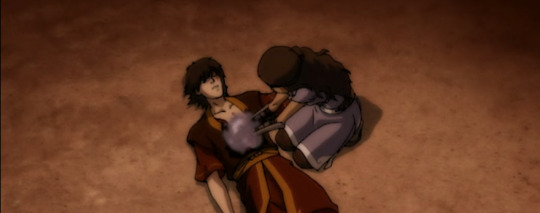
On the other hand, Aang throughout his harrowing fight against Ozai utilizes Earthbending time and time again to save himself, techniques that we've come to associate with Toph (rock armor and seismic sense). And to access the Avatar State, that had since been blocked, Earth had been the ultimate catalyst to unlocking his Seventh Chakra.
And if we take into consideration what Guru Pathik told Aang - to unlock the Seventh Chakra he would have to let go of Katara. In a sense, this could have been a visual representation of how Aang lets go of his love for Katara, and how Toph (Earth) could take up that role.
Earth, his opposing Element, saves his life.
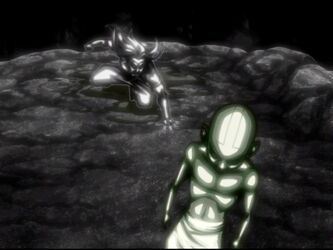
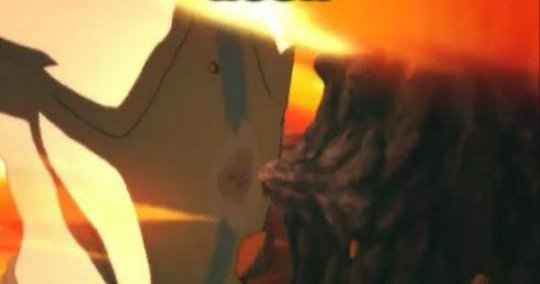
It's also interesting that our protagonists' conclusions and destinies are integrally tied to the aforementioned girls. Destiny and Fate are two major themes in ATLA, alonside the moral lesson shared to us by Uncle Iroh about the unity of the four elements and how each element can learn and grow from the other.
Zuko's destiny to bring honor to Fire Nation whilst also challenging his conflicting natures (Sozin vs. Roku; Ozai/Azula vs. Iroh) would have never come into fruition had it not been for Katara. Katara was the first person (other than his Uncle) to show him genuine compassion and humanity, she was the first person to glimpse into his true, kind and gentle nature. Additionally, had she not fought alongside Zuko to defeat Azula and save his life, he would have never been able to step up to the Throne and fulfill his destiny. Thus Katara is linked and bound to Zuko's destiny.
Aang's destiny was to restore peace to the world and end The One Hundred Year War. The Aang we meet during Book One - is timid and soft, a strong bender and with limitless potential, but he lacked the confidence, the back-bone, the grounding to step-up to his duties as the Avatar and defeat Ozai. Katara coddled him and never challenged him to look beyond himself. It's only after meeting Toph does Aang begin to confront his opponents with a different viewpoint, he gains a certain matureness in himself and suddenly we see him step up into his role and responsibilities. Toph's Earthbending not only saves him from death but it also gave him the strength to face his destiny. Thus, Toph is linked and bound to Aang's destiny.
It would have tied a lot of unexplored themes as well as provide a more satisfying conclusion (Aang entering the Avatar State because he followed through with Guru Pathik's lessons instead of pointy rock triggers it) and it would have been cohesive with the narrative thematic of ATLA.
I'm still astonished at how badly Bryke fumbled the bag with their romantic sub-plots. 🗿
#toph beifong#taang#aang x toph#anti bryke#anti kataang#atla aang#toph x aang#katara#zuko#zutara#atla critical
1K notes
·
View notes
Text
Katara and Mutuality in Relationships
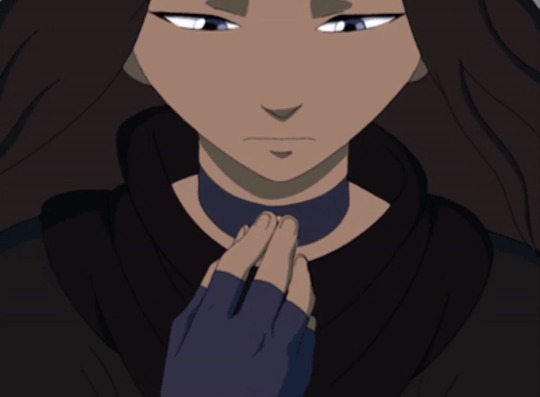
There are lots of conflicting opinions about which characters Katara felt attraction towards, which characters she didn’t, and how long she felt that attraction. I see in most cases, people point to quick clips of her faintly blushing or kissing another character on the cheek as evidence, but I think these kind of takes miss the nuance of the purpose attraction serves in a story.
Most importantly, I see these characters treated as if they are actually people capable of making their own decisions. It’s important to remember that these are fictional characters. They don’t make their own choices; the writers make their choices for them for the purpose of telling a story. From that standpoint, it’s more valuable to examine how a character’s story and narrative themes tie into their relationships with other characters. Animators can shove in a kiss or a blush wherever they want, but it’s harder to demonstrate through storytelling how and why two characters might feel attraction towards one another, and how a relationship between them would develop both characters and contribute to the overarching themes of the story.
In other words, when discussing which characters Katara is “attracted” to, I’m discussing which relationships and actions within the narrative build on her established story and arc. Romance is always integrated into a story for a reason, and considering that reason is important.
Unfortunately, ATLA is very much a product of its time in this way. It’s easy to see what romance adds to the arcs of the male characters—but not so much with the female characters. All three canon relationships (kataang, sukka, and maiko) follow this trend to some degree. The primary purpose of the woman in this narrative is to act as a prize for the man for performing some good deed. Once they’re together, she ceases having her own motivations and becomes an extension of the male character she’s dating. This is pretty blatant with Suki—she barely had a personality in that later seasons; she is there to be Sokka’s girlfriend. Similarly, Katara becomes a completely different character—she’s even animated differently—when the narrative pushes her into romantic scenes with Aang. Her character is flattened.
So what is Katara’s arc, and how do the romantic interactions she has throughout the series contribute to this?
Well, that could be a whole other essay itself, but to put it simply, Katara’s arc is one of a young girl devastated by grief at a young age clinging to hope that she has the power to fight and change the world for the better. Which she does as she gains power and confidence throughout the series—culminating in her defeating Azula in the finale.
But the part I want to focus on here is how Katara connects with other characters. She connects with them over shared experiences of grief and loss.
Take Haru, for instance.
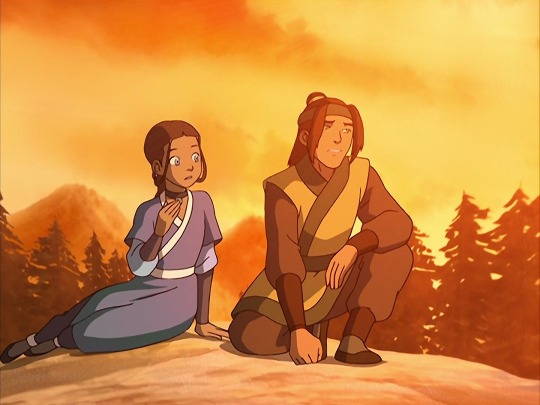
Haru: After the attack, they rounded up my father and every other earthbender, and took them away. We haven't seen them since.
Katara: So that's why you hide your earthbending.
Haru: Yeah. Problem is…the only way I can feel close to my father now is when I practice my bending. He taught me everything I know.
Katara: See this necklace? My mother gave it to me.
Haru: It’s beautiful.
Katara: I lost my mother in a Fire Nation raid. This necklace is all I have left of her.
Haru: It’s not enough, is it?
Katara: No.
This isn’t just a throwaway moment; it’s an important character moment that leads up to growth and the progression of Katara’s overall story, both in this individual episode and in the whole series.
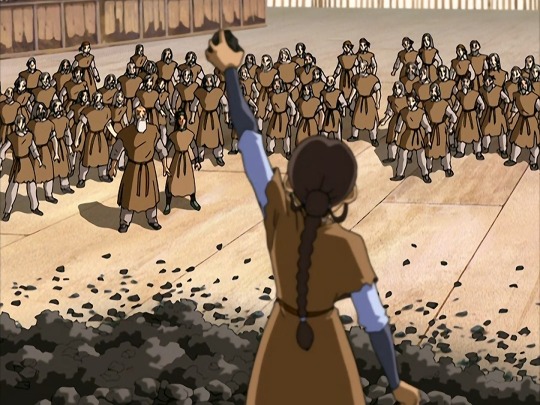
Katara finds her power in the connections she’s able to make with other characters. It’s a powerful driving force for her that makes her a strong character even before her bending abilities develop. Imprisoned was such an important episode to establish who Katara is and what her power is, and adds so much to her arc.
But there is one line in particular from the above exchange that also stands out: Haru says “it’s not enough, is it?” and Katara agrees. Even this early in the series, we’re establishing the fact that despite her drive and hopeful outlook, Katara feels deeply hurt, she feels a deep sense of loss that she opens up about to other characters in moments like these. But unlike Haru…Katara can’t go rescue her mother. Her mother is dead, and we see her grapple with that grief throughout the series.
Another character she reaches out to like this is Jet.
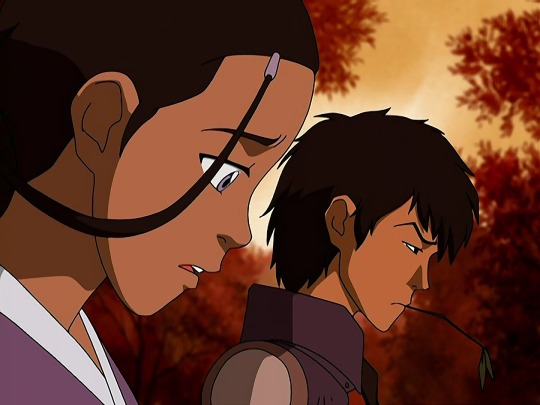
Jet: Longshot over there? His town got burned down by the Fire Nation. And we found The Duke trying to steal our food. I don't think he ever really had a home.
Katara: What about you?
Jet: The Fire Nation killed my parents. I was only eight years old. That day changed me forever.
Katara: Sokka and I lost our mother to the Fire Nation.
Jet: I’m so sorry, Katara.
Another important note about Jet is that there are explicit romantic feelings from Katara in this episode. Again, Katara empathizes with another character through a shared sense of loss. Sadly, in this case, Jet manipulated her feelings and tricked her into helping in his plot to flood the village…but those feelings were undeniably there.
That was the tragedy in this episode, but it also gives the audience so much information about Katara as a character: what motivates her, and what she wants. Katara is established as a character who wants someone who will connect with her and empathize with her over her loss—her greatest sense of trauma. She wants to help others but also receive support in return. The reason why she was smitten with Jet, beyond just initial attraction, is because he gave her a sense of that before Katara realized his true motivations.
A lot of people make the claim that Aang is good for Katara because he also feels a sense of great loss and trauma. And while on paper that’s true…does he really demonstrate that? I just gave two examples of characters Katara connected with this way, and both responded with deep empathy to what she said. Very early on in the show—the third episode—Katara attempts to connect with Aang the same way. How does he respond?
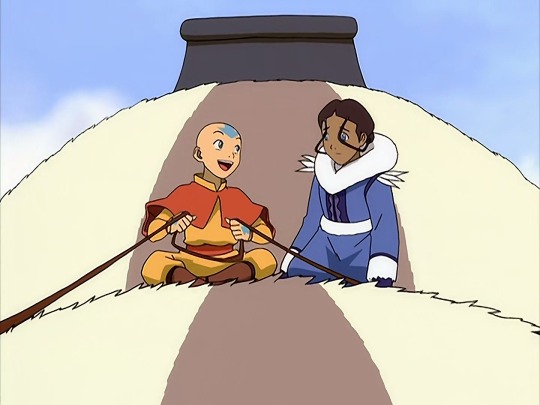
Katara: Aang, before we get to the temple, I want to talk to you about the airbenders.
Aang: What about 'em?
Katara: Well, I just want you to be prepared for what you might see. The Fire Nation is ruthless. They killed my mother, and they could have done the same to your people.
Aang: Just because no one has seen an airbender, doesn't mean the Fire Nation killed them all. They probably escaped!
Just compare this exchange to Haru and Jet. No effort to empathize, not even a “sorry for your loss” or anything. It’s a stark contrast, and the reason for that is because this narrative entirely centers Aang. Katara’s narrative always seems to be secondary to his when they’re together—which is exactly my point when I say this relationship has a fundamental lack of mutuality. It’s built that way from the beginning of the series. It does not add to Katara’s arc nor establish what about this dynamic would attract her.
And, look, before someone jumps down my throat about this…I’m not saying Aang is a horrible person for this response. I think it’s a sign that he’s immature and has a fundamentally different approach to problems than Katara. Katara is a character who has been forced to take on responsibilities beyond her years due to being a child of a war-torn world. Aang’s approach to problems is avoidance while Katara never had that luxury. It doesn’t mesh well.
This is all in Book 1. I honestly could have gotten on board with Kataang if the series meaningfully addressed these issues…but it didn’t. In fact, they actually got worse in some ways.
Back to Katara’s mother. We’ve established that this is a core part of Katara’s character and like in the scene with Haru, she indicates that this is an unresolved issue that pains her. But then, in Book 3, Katara actually does get a chance to confront this pain.
This would have been a powerful moment. Surely the character who is meant to be her partner, her equal, would have been there for her. Surely he would have understood and supported her, fulfilling her narrative and adding to her story.
But Aang didn’t do that. I won’t go into details because there are a million analyses out there on The Southern Raiders, but Aang’s response to Katara was the opposite of understanding. He got angry with her, insinuated that she was a monster for wanting revenge, and tried to dictate her behavior according to his own moral values. And importantly, from a narrative standpoint, he did not go with Katara. One of the most important events in her arc, and Aang didn’t support her—he actually tried stopping her. He didn’t contribute to her growth and development.
Also noteworthy:
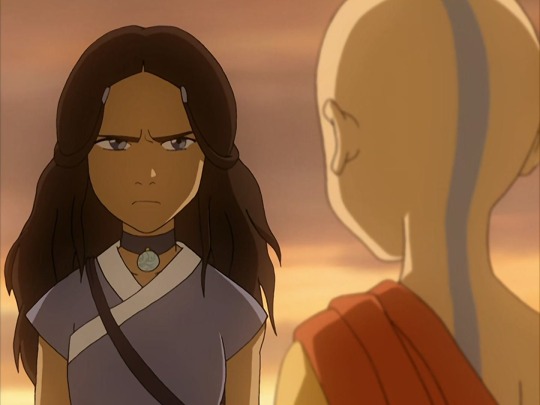
Katara: But I didn’t forgive him. I’ll never forgive him.
Even at the end of the episode, Aang clearly doesn’t understand at all what Katara is feeling. This line demonstrates it perfectly. He thinks she forgave him when that wasn’t the case at all…but of course, he didn’t even accompany her, so he didn’t see what actually took place. His worldview is fundamentally different from hers, and he’s consistently too rigid in his morality and immature to center Katara’s feelings.
Throughout Katara’s whole arc, her most significant character moments, Aang’s character just doesn’t come through the way Katara’s constantly does for him. Their narrative lacks mutuality. When Katara and Aang are together, she becomes an accessory to him. The ending scene is a perfect demonstration of this.
Now, to address the elephant in the room.
Which character does actually add to Katara’s narrative and support her growth as a character?
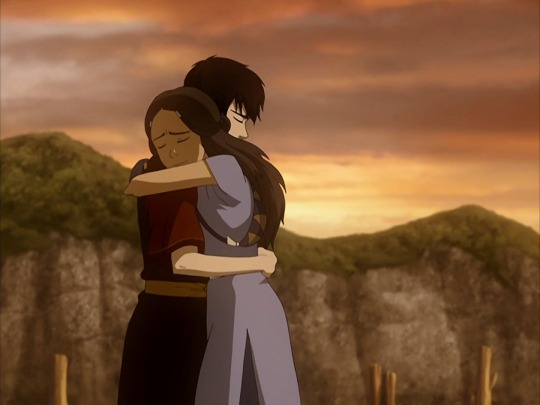
Correct! I just talked about how important The Southern Raiders is to Katara’s character and story, how it’s a chance for her to finally address the grief she’s been carrying since Book 1. And who stood by her side throughout this pivotal moment? Right—Zuko did.
You can talk all you want about how he’s a “colonizer” while Aang’s people suffered genocide, but you’re forgetting that “show, don’t tell” is one of the most basic aspects of storytelling. The fact is, despite how it looks on paper, Zuko was the one there for Katara at her critical moments. Zuko empathized with Katara more than Aang ever did—as demonstrated in this episode. Zuko never once brought up his own cultural values. Zuko never once told Katara what to do. Zuko’s position was that Katara should be the one to decide, and that he would support any choice she made. He supported her decision to spare Yon Rha, but he would have also supported her if she decided to kill him. I actually found this episode to be a satisfying reversal to what is typically seen in TV—for once, the female character is centered while her male counterpart takes the backseat and becomes a supporting role to her narrative.
Even before this, Zuko is shown to empathize with Katara.
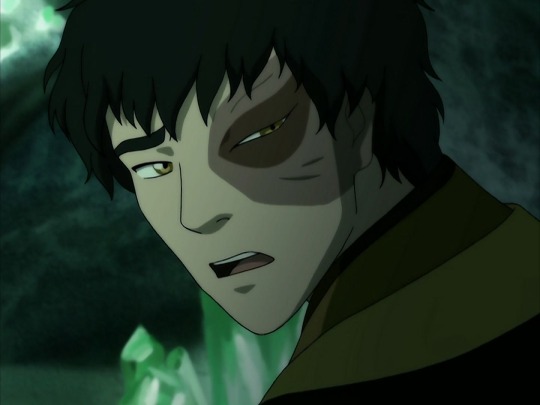
Zuko: I’m sorry. That’s something we have in common.
I think what gets me about this scene is the fact that he’s still Katara’s enemy, and she was just yelling about how she hates him and his people. But despite that, Zuko still empathizes with Katara. She is fundamentally human to him, and he expresses that to her in a way that allows them to connect. Zuko stands to gain nothing from this. It’s true that Azula entered the picture and twisted things around—but in this moment, Zuko’s compassion is genuine. His instinct was to respond to her grief with empathy, just like she consistently does for other characters.
And finally, how else does Zuko add to Katara’s arc?
I don’t think there is any more perfect of an example than the finale itself—the culmination of the arcs and development of all characters.
Zuko and Katara fight together. In a heartbeat, Zuko asks Katara to fight by his side against Azula, because he trusts her strength. She’s his equal—both in his mind, and in a narrative sense.
Then, this:
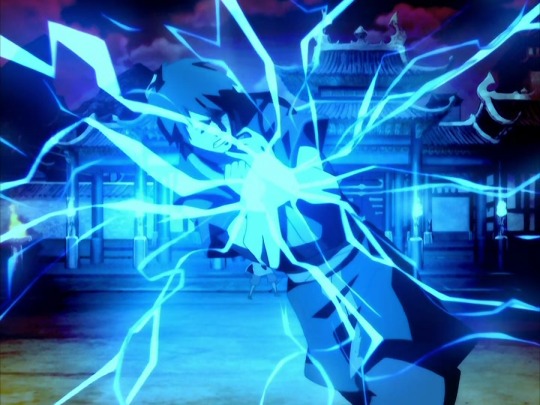
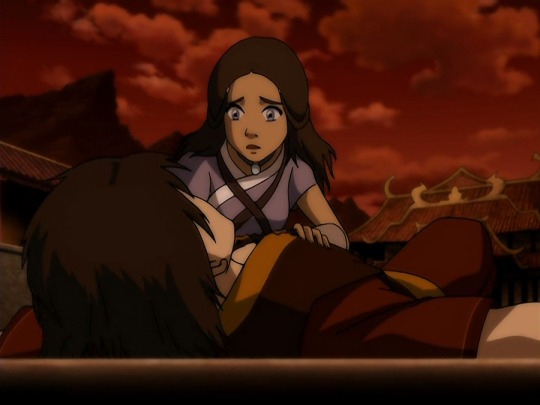
Both of their roles are so critical in this fight. They both save each other. The scene has such raw emotion to it. These characters were together at the conclusion of their respective arcs for a reason.
This is the perfect conclusion to Katara’s arc. She just played a critical role in ending the war that has caused her trauma her whole life. She just demonstrated her mastery of waterbending (another thing she’s dreamed of throughout the series) by defeating the world’s most powerful firebender during Sozin’s Comet. Even though she had help as all characters do, these are victories that belong to her and demonstrate the growth and power of her character. And to top it all off? She was able to save Zuko’s life. She didn’t have to endure the pain of feeling helpless to do anything while someone else died for her; this time, she had an active role, she changed her fate, and she prevailed. Zuko plays an important role in Katara’s story without dominating it. They perfectly represent mutuality. They add to each other’s stories. Their narratives become stronger when they’re together, without one diminishing or sidelining the other.
So, from that standpoint, that’s why I always see the attraction between Zuko and Katara and why I see it lacking between Aang and Katara. Zuko and Katara’s story doesn’t need some cheap little throwaway moments to shine. It’s integral to both characters’ stories. We are shown not told of the way these characters feel about each other. Given everything we know about Katara, her goals, her values, her past loves…absolutely everything points to Zuko being the true subject of her feelings.
Because let’s be honest. The ending I just described is so much more powerful and so much more Katara than seeing her being relegated back to a doe-eyed love interest for Aang to kiss. It hardly even made sense—Katara played no role at all at the culmination of Aang’s arc. She was relegated back to a love interest, rather than the powerful figure we saw fight alongside Zuko.
#zutara#katara#zuko#atla#anti kataang#canon critical#jet#haru#katara deserved better#aang critical#meta#analysis
376 notes
·
View notes
Text
Just wanted to say that when Aang was struck by lightning he was letting go of his attachment to Katara and when Zuko was struck by lightning he was literally saving Katara’s life.
I suppose the argument could be made that by unblocking that last chakra and gaining control over the avatar state, Aang was trying to save Katara from everyone that was attacking them but Aang was in that room too. He was saving himself just as much as he was saving Katara, he didn’t know Azula was going to hit him with lightning. Also, the world needs its avatar.
Zuko, on the other hand, knowingly risked his life solely for Katara. He made the decision to be struck by lightning to save her. He knew that Katara had used up all her spirit water to heal Aang after he was hit by lightning and he still jumped in front of Katara. He knew that he could have died.
Like wtf happened? How does a show fuck up the romance this badly? Everything else played out so beautifully.
#pro zutara#zutara#zutarian#zuko x katara#atla#avatar the last airbender#atla critical#anti bryke#zutara forever
352 notes
·
View notes
Text
“I think Zuko and Katara would’ve made a cute couple”
normal person irl: oh yeah, now that you mention it I can see it
ATLA fan online: Zutara fans are DELUSIONAL and so ANNOYING. There is NOTHING in the entire show that indicates anything romantic whatsoever. EVERYONE hates Zutara. Katara would never get with her colonizer and Zuko loves MAI. Katara and Aang are SOULMATES. You just like Zutara because they look good together. Well joke’s on you because Aang got Katara pregnant THREE TIMES —
#atla fandom critical#me talking to my friends irl vs me going into the ATLA tag / the ATLA subreddit#Zutara#The discourse is so unhinged
453 notes
·
View notes
Text
Zuko Doesn't Like 𝖬𝖺𝗂's Apathy
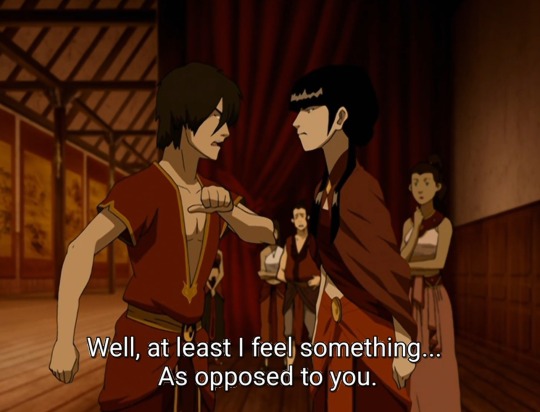

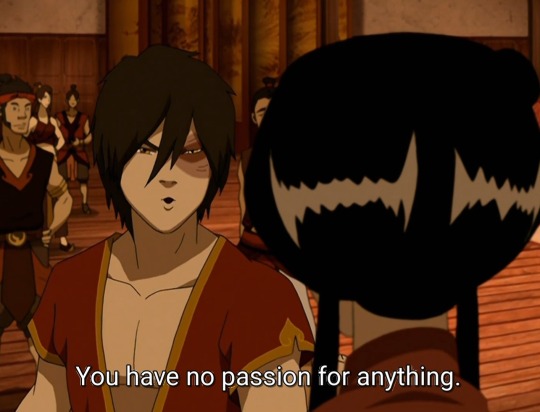
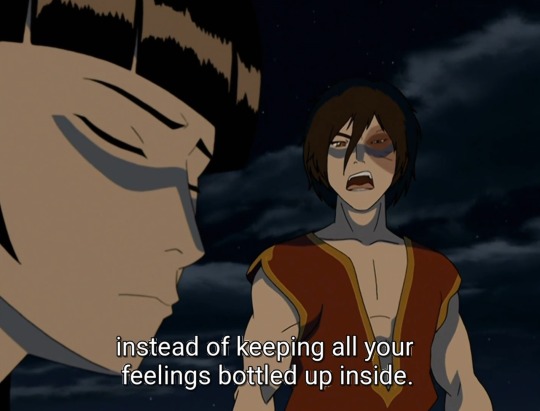
But I already hear you say, "These lines are from fights. He's angry and says things he normally wouldn't". I would argue that even though he's angry, his anger has to stem from some truth, but okay.
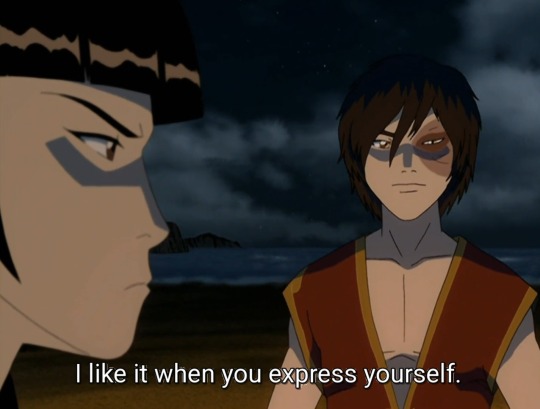
Here he's trying to appeal to 𝖬𝖺𝗂, appreciaying her, and is doing so through the one time she isn't her normal, apathetic self. Clearly he likes her, but he wishes she was someone else.
But you know who does have passion? Who does express herself?

#zutara#anti anti zutara#pro zutara#zutara analysis#zutara evidence#zutara forever#zutara meta#zutara nation#zutara should have been canon#zutara supremacy#zutara was robbed#zutarian#zuko x katara#katara x zuko#anti maiko#anti bryke#atla critical#atla critisism
508 notes
·
View notes